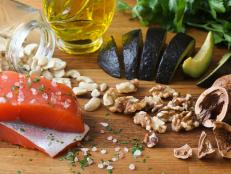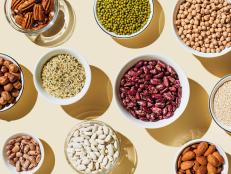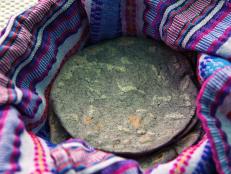Are There Major Disadvantages to the Mediterranean Diet?
Really, we could answer this with one word...

Dusan Zidar/Getty Images
Wouldn't you like to "diet" like this: enjoy lots of sweet and in-season fruits, crisp vegetables, bowls of pasta and whole grains, rich and creamy yogurt, aged cheeses, hearty bean dishes, large handfuls of bright green herbs over everything, abundant seafood and fish, reasonable portions of meat and chicken, an egg a day, and a glass of wine here and there.
If you opt in, you'll be eating one of the healthiest ways on the planet. And the best part is that it's less diet — a term that can bring to mind deprivation — than the Mediterranean lifestyle.
The Mediterranean diet was named the Best Diet in 2019, and for good reason. This healthful pattern of eating is backed up by years of nutrition science. But are there disadvantages to actually following the Mediterranean diet? As the coauthors of the best-selling book The 30-Minute Mediterranean Diet Cookbook, Deanna Segrave-Daly, RD, and I sometimes hear myths about this diet. Here are the facts about the lifestyle we've been living for decades.
Myth: It's expensive.
Fact: The Mediterranean diet is budget-friendly. The Mediterranean pantry is made up of foods you probably already have on hand. No need to purge your pantry — just start using more canned tuna, jarred olives, dried and canned beans, canned tomatoes and other vegetables, instant brown rice and bulk-section whole grains, dried pasta, and nuts and seeds. In your freezer, stock frozen fish fillets and frozen fruits and veggies. The fridge should contain plain yogurt, aged cheeses, eggs and maybe some fresh herbs.
Myth: It's time-consuming to cook.
Fact: Most Mediterranean meals can be done in 30 minutes or less. As a working mom, it's not uncommon for me to walk into my kitchen at 5:15 p.m. and serve dinner before 6 p.m. My go-to dishes are fish cooked straight from frozen (don't thaw first!), whole-grain bowl dinners, one-pot pastas, egg dishes like shakshuka, or whole-wheat toast that's topped with hummus and veggies, sprinkled with cheese and then popped under the broiler.
Myth: It doesn't include any Asian or Mexican food.
Fact: The Mediterranean table is adaptable to global tastes. Mexican may not seem Mediterranean, but a corn tortilla topped with black bean and mango salsa along with chicken or fish and lots of fresh cilantro certainly fits into the Mediterranean style of eating. Hallmarks of the Mediterranean Diet include the following and can be thrown together in any style of cuisine you choose, from Nordic to South American:
- Lots of fresh, frozen and even canned (in 100% juice) fruit; 3 servings a day
- Plenty of fresh, frozen (no sauces or breading) and canned (plain) vegetables; 3 servings a day
- A handful of nuts and/or seeds as a snack each day
- Fresh, frozen and canned fish and seafood; 2 servings a week
- Whole grains like brown rice, bulgur, whole-wheat couscous, wild rice, farro, and even corn tortillas and South American quinoa
- Pasta in a million different recipes
- Black beans, garbanzo beans, pinto beans, Great Northern beans, lots of lentils and even chili beans; 3 servings a week
- Fermented dairy foods like yogurt, Icelandic skyr, labneh and aged cheese from around the world are an important source of probiotics and protein
- Olive oil and green or black olives (olives are eaten daily in Mediterranean regions)
- Eggs
- Poultry and red meats including lean beef, lamb and some cured meats like cured beef or pork sausages or thin-sliced prosciutto
- Bakery treats saved for special occasions
Myth: It's for people with heart disease.
Fact: It's for the whole family. While some of the earliest research points to cardiovascular benefits of the Mediterranean Diet, researchers have more recently shown this lifestyle can have benefits for children and even babies. In recent studies scientists found that children and babies of women who eat the Mediterranean diet while pregnant have less asthma, wheezing and breathing problems. In additional research, it's been found that eating the Mediterranean way can lead to better brain health and gut health, less diabetes and cancer, and less overall inflammation in the body.
Best of all, the Mediterranean diet tastes delicious, day after day, for a lifetime.
Serena Ball, MS, RD, is a registered dietitian nutritionist, food writer and recipe developer. She blogs at TeaspoonOfSpice.com and is the author of the best-selling The 30-Minute Mediterranean Diet Cookbook. Follow her @TspCurry on Twitter and Instagram.
Related Stories:































































